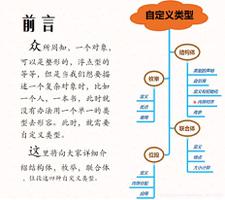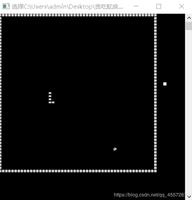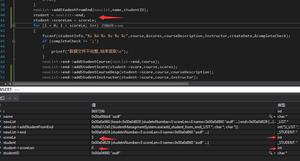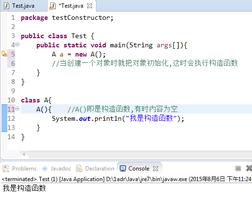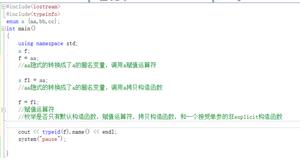让结构体按某一个属性排序,减少排序函数复用,怎么弄?
题目:
给出n个学生的考试成绩信息,每条信息由学号、姓名与分数组成。要求首先按学号对信息进行排序,然后再按分数进行排序,并要求分数相同的仍然按学号有序,输出每次排序的结果。
存储方式用的是结构体数组" title="结构体数组">结构体数组,写好排序函数以后发现题目说要分别按学号和分数排序,如果按简单思路的话就是一个排序用一个函数,只改了一处地方,感觉很亢余:
printf("按学号排序:\n");SelectSortbyOrder(student);
for(p=student;(p+1)->score!='\000';p++){
printf(
"学号:%d\n姓名:%s\n分数:%d\n地址:%p\n\n",p->order,p->name,p->score,p);}
printf(
"\n");printf(
"再按分数排序:\n");SelectSortbyScore(student);
for(p=student;(p+1)->score!='\000';p++){
printf(
"学号:%d\n姓名:%s\n分数:%d\n地址:%p\n\n",p->order,p->name,p->score,p);}
printf(
"\n");return0;
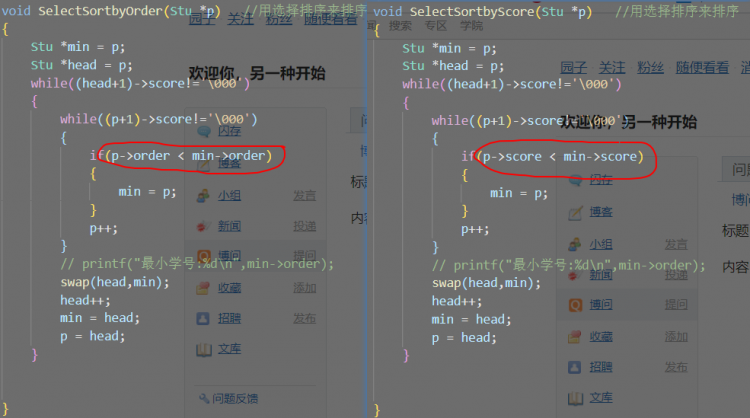
于是想修改排序算法的代码让其能按照结构体的某个属性来排序
直接的想法就是通过函数传入对应语句,但在C中要如何实现?
代码:
#include <stdio.h>#include
<stdlib.h>#define TRUE 1
#define FALSE 0
struct Students
{
int order;
char *name;
int score;
};
typedef struct Students Stu;
void swap(Stu *a,Stu *b)
{
Stu temp;
temp.order = a->order;
temp.name = a->name ;
temp.score = a->score;
a->order = b->order;
a->name = b->name ;
a->score = b->score;
b->order = temp.order;
b->name = temp.name ;
b->score = temp.score;
}
void SelectSortbyOrder(Stu *p) //用选择排序来排序
{
Stu *min = p;
Stu *head = p;
while((head+1)->score!='\000')
{
while((p+1)->score!='\000')
{
if(p->order < min->order)
{
min = p;
}
p++;
}
// printf("最小学号:%d\n",min->order);
swap(head,min);
head++;
min = head;
p = head;
}
}
void SelectSortbyScore(Stu *p) //用选择排序来排序
{
Stu *min = p;
Stu *head = p;
while((head+1)->score!='\000')
{
while((p+1)->score!='\000')
{
if(p->score < min->score)
{
min = p;
}
p++;
}
// printf("最小学号:%d\n",min->order);
swap(head,min);
head++;
min = head;
p = head;
}
}
void SelectSort(Stu *p,int *value) //用选择排序来排序
{
Stu *min = p;
Stu *head = p;
while((head+1)->score!='\000')
{
while((p+1)->score!='\000')
{
if(p->score < min->score)
{
min = p;
}
p++;
}
// printf("最小学号:%d\n",min->order);
swap(head,min);
head++;
min = head;
p = head;
}
}
int main()
{
Stu student[3];
Stu *p;
int i=0;
student[0].order = 402; // 初始化
student[0].name = "zdz";
student[0].score = 79;
student[1].order = 403;
student[1].name = "zdl";
student[1].score = 62;
student[2].order = 401;
student[2].name = "zxl";
student[2].score = 83;
printf("初始记录:\n");
for(p=student;(p+1)->score!='\000';p++)
{
printf("学号:%d\n姓名:%s\n分数:%d\n结构体地址:%p\n学号地址:%p\n姓名地址:%p\n分数地址:%p\n\n",p->order,p->name,p->score,p,p->order,p->name,p->score);
}
printf("按学号排序:\n");
SelectSort(student,&student->order);
for(p=student;(p+1)->score!='\000';p++)
{
printf("学号:%d\n姓名:%s\n分数:%d\n地址:%p\n\n",p->order,p->name,p->score,p);
}
printf("\n");
printf("再按分数排序:\n");
SelectSort(student,&student->score);
for(p=student;(p+1)->score!='\000';p++)
{
printf("学号:%d\n姓名:%s\n分数:%d\n地址:%p\n\n",p->order,p->name,p->score,p);
}
printf("\n");
return0;
}
#include <stdio.h>
#include<stdlib.h>
#define TRUE 1
#define FALSE 0
struct Students
typedef struct Students Stu;
void swap(Stu *a,Stu *b)
void SelectSortbyOrder(Stu *p) //用选择排序来排序
void SelectSortbyScore(Stu *p) //用选择排序来排序
void SelectSort(Stu *p,int *value) //用选择排序来排序
int main()
回答
#include <stdio.h>#include
<stdlib.h>#define TRUE 1
#define FALSE 0
struct Students
{
int order;
char *name;
int score;
};
typedef struct Students Stu;
void swap(Stu *a,Stu *b)
{
Stu temp;
temp.order = a->order;
temp.name = a->name ;
temp.score = a->score;
a->order = b->order;
a->name = b->name ;
a->score = b->score;
b->order = temp.order;
b->name = temp.name ;
b->score = temp.score;
}
void SelectSort(Stu *p,int choose) //用选择排序来排序
{
Stu *min = p;
Stu *head = p;
while((head+1)->score!='\000')
{
while((p+1)->score!='\000')
{
if(choose == 0)
{
if(p->order < min->order)
{
min = p;
}
}
elseif (choose == 1)
{
if(p->score < min->score)
{
min = p;
}
}
p++;
}
// printf("最小学号:%d\n",min->order);
if(head->score > min->score)
swap(head,min);
head++;
min = head;
p = head;
}
}
int main()
{
Stu student[3];
Stu *p;
int i=0;
student[0].order = 402; // 初始化
student[0].name = "zdz";
student[0].score = 79;
student[1].order = 403;
student[1].name = "zdl";
student[1].score = 62;
student[2].order = 401;
student[2].name = "zxl";
student[2].score = 83;
printf("初始记录:\n");
for(p=student;(p+1)->score!='\000';p++)
{
printf("学号:%d\n姓名:%s\n分数:%d\n地址:%p\n\n",p->order,p->name,p->score,p);
}
printf("按学号排序(输入 0):\n");
SelectSort(student,0);
for(p=student;(p+1)->score!='\000';p++)
{
printf("学号:%d\n姓名:%s\n分数:%d\n地址:%p\n\n",p->order,p->name,p->score,p);
}
printf("\n");
printf("再按分数排序(输入 1):\n");
SelectSort(student,1);
for(p=student;(p+1)->score!='\000';p++)
{
printf("学号:%d\n姓名:%s\n分数:%d\n地址:%p\n\n",p->order,p->name,p->score,p);
}
printf("\n");
return0;
}
@Conan-jine 已自己解决,其实你想表达的思想是用布尔值做判断条件来使用哪个语句,但是本来就可以用if封装语句,没必要再设两个函数那么麻烦。
以上是 让结构体按某一个属性排序,减少排序函数复用,怎么弄? 的全部内容, 来源链接: utcz.com/a/69802.html


